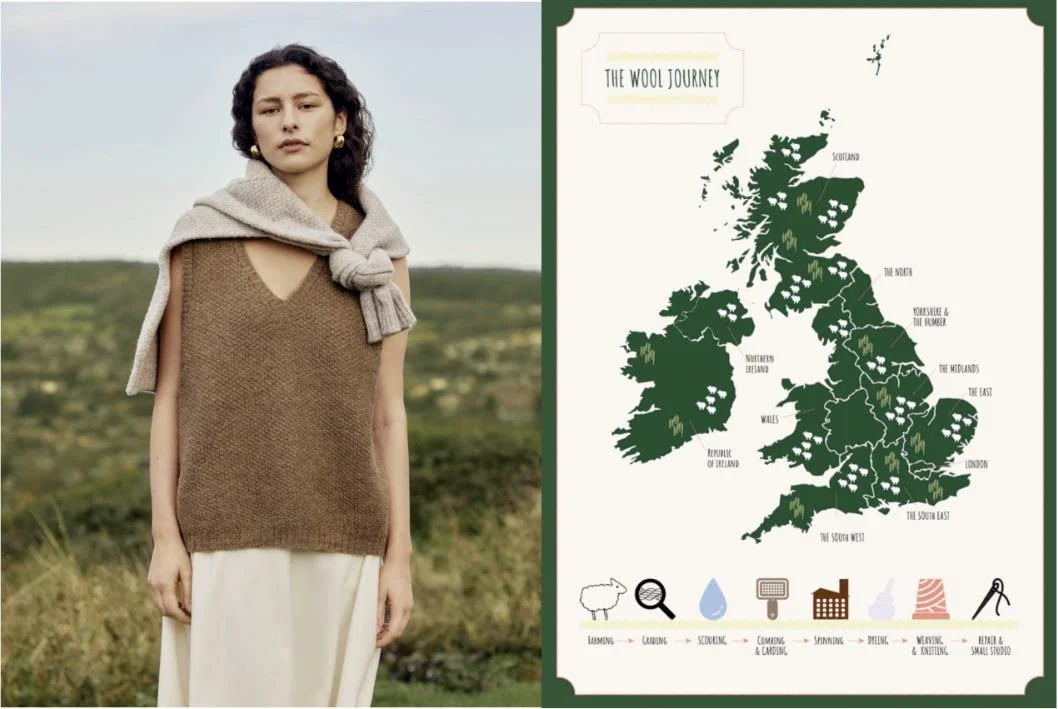From Heritage to Innovation: Cotton, Wool, Leather, and the Rise of Bio-Materials
Safia Minney (L), Meredith Wood, Harriet Fletcher-Gilhuys, Sara Grady and Felix Bartlett (R). Image Credit: Tom Glenn-Olson
Harriet, Textiles Researcher at Fashion Roundtable and lead on the project The Great British Wool Revival attended the Fashion District Festival in Spitalfields last week, to be part of the ground-breaking Future and Past Fabrics panel discussion chaired by MBE Safia Minney.
The afternoon consisted of a range of talks that covered topics around bio-design such as Ponda, who founded the planet regenerating Bio Puff material which is used as insulation for clothing and accessories - to Clare Litchfield, the co-founder of the plant-based sequin brand and Imperial College start-up Sequinova.
Clare spoke about her sequins that recently made coverage at Paris Fashion Week, where the start-up collaborated with the luxury fashion brand Stella McCartney and has recently been showcased as the world's first ever commercial use of plant-based sequins. The sequins offer an alternative to fossil-fuel derived plastics, while still achieving incredible aesthetic and performance benefits.
The talks continued covering a range of topics from barriers to entry and interjection into the fashion industry, to policy compliance and regulations around Ecodesign for Sustainable Products (ESPR).
Harriet was then invited to join the panel chaired by Safia Minney, alongside Sara Grady (British Pasture Leather), Meredith Wood (Colour Earth) and Felix Bartlett (Biothread). The discussion began with a series of introductions where each speaker delved into their fibre, vision and motivations for change. Each speaker brought an object to discuss in further detail and pass around the audience. Harriet brought her jumper which she sheared, spun and knitted by hand in one year following the farming year and natural seasons.
Conversations moved on, with each speaker discussing their interpretation of regeneration and what this means to them - Sara spoke about the importance of land and soil health and our understanding as humans of the wider eco-system. Harriet covered the importance of incentivising farmers to breed for both meat and wool, to ensure a strong wool clip each year, whilst supporting an economic framework that pays farmers a fair price and allows them to thrive.
Safia spoke about emotional resilience and the significance of connecting people with the environment, highlighting the many broken fashion production systems. She also raised awareness of the importance of an emotional connection with an animal, face or material - this is often overlooked when creating bio-materials and a constant search for newness.
“There is a real need to attach a human face to the supply chain, creating links between the farmers, workers and the financial aspect. There is currently too much of a focus on the consumer and not enough attention on the supply chain and how this functions” - Safia Minney.
There are so many incredible benefits of bio-materials and its applications and it’s great that more designers and engineers are thinking in this way. However, it is important to note the ground-breaking opportunities that natural fibres present such as wool, with 100% bio-degradability and outstanding climate beneficial properties. If it was founded today, it would be classed as a true super fibre!
British knitwear brand John Smedley becomes brand partner and key sponsor of The Great British Wool Revival
John Smedley S/S 2025 Lifestyle Collection using British wool (L) and the GBWR map (R). Image Credit: John Smedley and the GBWR
London, June 2025 - The Great British Wool Revival in partnership with John Smedleyare teaming up to champion British wool, having previously partnered with YOOX Net-a-Porter.
As an environmentally friendly and locally sourced material, wool is perfectly positioned to play a pivotal role in sustainable and regenerative fashion systems, and to support local economies, from rural farmers to designers and businesses of all sizes. With over 200 companies joining to date, The Great British Wool Revival aims to support the collective ambition to increase the uptake of British wool. As the oldest knitwear manufacturer in the world, a key pillar of John Smedley’s ethos is platforming the benefits of British craftsmanship across its manufacturing. Since the brand first introduced British wool in 2015, it has become a mainstay of limited-edition and mainline winter collections, showcasing the best of British sheep including the heralded Blue Faced Leicester and Cheviot breeds, Wools from the Duchy of Cornwall Estate, Alpaca and Guanaco fibres with each garment varying from machine knits crafted at John Smedley’s iconic factory in Lea Mills, Matlock to hand knitted pieces by individual artisans which take over 100 hours to knit.
The collaboration across this year and next will see the platforming of British wools across a range of projects. Working alongside Derby Museums, John Smedley’s Sustainable School Uniform Project aims to educate the next generation on the benefits of British wool, allowing students to create the school jumper of the future. Additionally, the brand’s winter campaign will beautifully showcase the capabilities of British wool across both commercial machine knitted products and hand knitted yarn and one-off pieces, allowing the audience to engage with the textile and the stories of the farmers, spinners and knitters within these processes. This will also mark the first time John Smedley makes available it’s yarns and knitting patterns to enable consumers to craft their own sustainable sweater.
In Spring 2026, John Smedley will come together with The Great British Wool Revival for the UK Wool Conference in association with The King’s Foundation to address the current challenges and potential opportunities for British wool, with the view to provide more brands with support in developing collections with British wool from AW26.
On the new partnership, Founder of Fashion Roundtable, Tamara Cincik, comments,‘The Great British Wool Revival is a timely initiative, which we at Fashion Roundtablecreated to plug a systems gap from farm to designer and industry. This supported the fantastic Modern Artisans Programme for the Kings Foundation and aligns with our shared values of provenance, local supply chains, textile craft and best of British. We are delighted to be partnering with John Smedley to continue this important and timely work, particularly as The Great British Wool Revival grows from strength to strength, as more businesses see the benefits of using local supply chains, regenerative practices and of course in championing British wool. The Great British Wool Revival is a true innovator, and we can’t wait to share our next steps alongside John Smedley with you all.’
Jess Mcguire-Dudley, Managing Director John Smedley said, “For over 10 years since I first joined the John Smedley company, we have been championing British wools across our collections, and since that time our use of British wools has grown by over 50%, I am delighted that one of my first acts as Managing Director is to further our support for this wonderful fibre by partnering with The Great British Wool Revival to ensure the tools they are creating can continue to support the wider industry. We saw how much our offer to support brands with British manufacturing by opening up our third-party manufacturing resonated, and I would urge these brands will now also look to British wools to create truly trace-able collections full of provenance. Together we can hope to re-build the wonderful traditions and crafts of the UK by supporting the many artisans across farm, spinning, design, manufacturing and many other areas.”
PR Contact: sarah@dlx.co
About John Smedley:
Established in 1784, John Smedley, holder of HM King Charles III Royal Warrant of Appointment, has built its name in crafting the finest merino knitwear in England for centuries — it remains the oldest, still operational factory in the world. Through its circularity project John Smedley is committed to responsible production and its mission to fulfil its own emission-reducing targets. In 2024, it invested over £3 million in machinery bolstering its production line in order to reintroduce third-party manufacturing which aims to encourage brands to bring knitwear manufacturing back to UK shores. From Autumn/Winter 2024, the brand introduced men’s and women’s lifestyle staples to complement the core knit offering and has recently launched a diffusion line, JS by John Smedley, bringing British made knitwear to a wider audience. Made in England. Rooted in History. Designed for today.
About The Great British Wool Revival:
The Great British Wool Revival, launched in 2024 and is a groundbreaking initiative that remapped a broken system from farmer to designer. Acting as a hub for knowledge sharing, The Great British Wool Revival was developed to support our ambition to see British wool grown on our hills, take pride of place in our wardrobes.
The website connects stakeholders across every facet of the supply chain from natural dyes, best-case practice and on-shore manufacturing from field to final product. This makes the production process for designers as easy and simplified as possible, making British wool more accessible and encouraging best-case practice.


